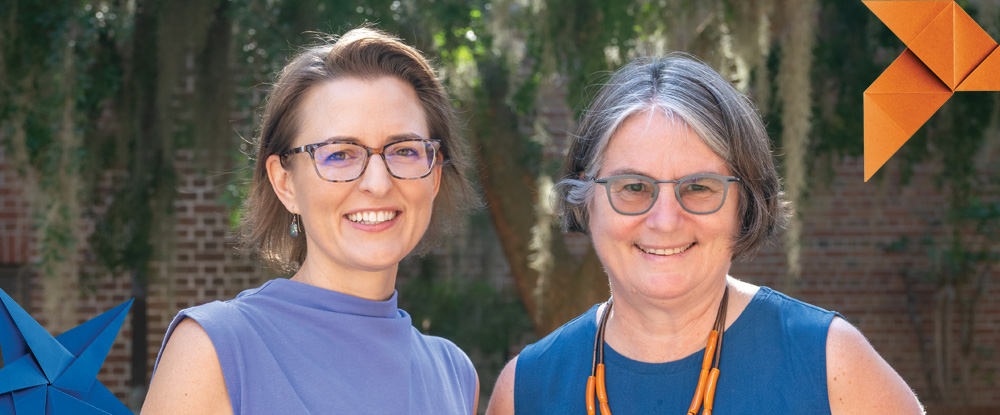At the end of my term as Rothman Chair and Director of the Center for Humanities and the Public Sphere (CHPS), I reflect on the past six years. Responding to the needs of diverse scholarship, we expanded the range of our internal grants. The humanities center also extended its reach among undergraduate students with the Humanities Engagement Scholars program and the Intersections program funded by the Mellon Foundation. Extensive programming and individual mentoring for graduate students culminated in the Humanities Graduate Summer Institute and public humanities summer internships. The highly successful annual Writing Retreat provided faculty members with time to focus while enjoying a community of scholars. “Rethinking the Public Sphere” defined the annual speaker series to explore questions of democracy, data, and public humanities.
During my term, the humanities center deepened its connections to regional and national organizations, such as the National Humanities Center and the National Humanities Alliance. Delegations from UF advocated for the humanities on the Hill on Humanities Advocacy Days. Collaborating with other humanities centers led to fruitful outcomes. For example, the Willson Center for Arts and Humanities at the University of Georgia led a multi-institutional Mellon Consortium grant focusing on environmental humanities in the Southeast of the U.S. that included UF scholars.
Over the years, I especially cherished learning about scholarship at UF. Leading the discussion of over 90 research presentations by the Rothman Faculty Fellows, the Rothman and Tedder Family Doctoral Fellows, and other CHPS awardees taught me about the cutting-edge research that UF doctoral students and faculty undertake. Facilitating scholarly conversations regularly invigorated my sense of the important contributions of humanities scholarship to UF’s knowledge production.
I have also valued the deep and meaningful engagement with community members who work tirelessly to enrich life in North Central Florida. Events co-organized with community organizations were always special. For example, an elaborate celebration of poetry at the A. Quinn Jones Museum & Cultural Center and a workshop about African American heritage at the Cotton Club Museum and Cultural Center pointed toward possibilities of invigorating future collaborations between the university and its surrounding community.
Over the years, faculty, graduate and undergraduate students, and staff members contributed tirelessly to the work at the Center, bringing their talents and leaving their mark. The committed members of the advisory board were always ready to discuss proposals and concerns of the profession, from academic publishing to creating sustainable frameworks for humanities scholarship.
I am grateful to all those who have supported the humanities center during my term. I am delighted to welcome Jaime Ahlberg to the helm and am confident that we will look forward to many more active years of engagement with the humanities!

Barbara Mennel
Outgoing Rothman Chair and Director | Center for the Humanities and the Public Sphere
I am privileged and delighted to step into the role of Rothman Chair and Director of the Center for the Humanities and the Public Sphere (CHPS) and to continue our commitment to humanities programming for scholars, students, and the North Central Florida community.
I know I am not alone in appreciating the period of growth that Professor Barbara Mennel oversaw during her six-year term as Director. I thank her for her positive spirit and tireless devotion to the Center’s mission, programs, and constituents. As I take the Center into a new chapter, I am motivated by three interconnected goals: encouraging humanities research, investing in undergraduate and graduate students, and supporting publicly-engaged programming.
Scholarly research in the humanities is the backbone of CHPS’s work. The creativity, productivity, and care of faculty are key to shaping humanistic questions and bringing projects to life for students and the public. Connecting faculty to grants and fellowships, creating spaces of cross-disciplinary interaction, and serving as a hub for intellectual engagement, are central to our mission.
Students also continue to be an important constituent. I am excited to be at the beginning of a new initiative to support undergraduate research in the humanities. Next year we aim to introduce programs that immerse students in the experience of knowledge production through research. This year we will continue to invest in programming for humanities graduate students, supporting their research, connecting them with other areas of campus, and raising awareness of the value and versatility of their humanities MAs and Ph.D.s.
One of my main priorities for CHPS is creating an infrastructure of engagement between the university and the community. Identifying debates that should be had but are not yet happening, informing debates, and delivering performances and lectures help to demystify what happens in campus offices and classrooms. When outreach is done well, it makes vivid what our work can contribute to society more broadly.
And yet, there is more to community engagement than outreach. My aspiration is to foster genuine exchanges and enduring relationships between the university and our community partners. I look forward to the opportunity to amplify voices in the community, shed light on local histories and places of significance, and connect our shared histories to the world we inhabit today.
Part of what makes CHPS so special is that it serves people with different but overlapping interests, goals, knowledge, and skills. Moving into the role of Rothman Chair and Director, I most look forward to opening conversations that strengthen awareness of the value of humanistic questions and methods to these varied groups, and to society more generally. I hope to see you at some of our events!

Jaime Ahlberg
Rothman Chair and Director | Center for the Humanities and the Public Sphere
Read more articles from the CHPS 2022-23 Annual Newsletter >
